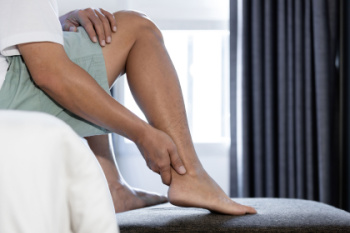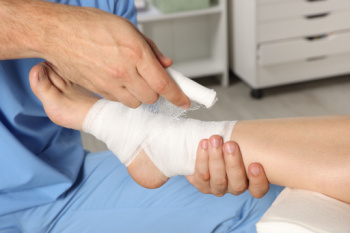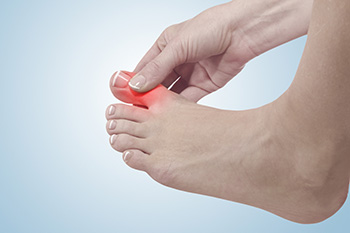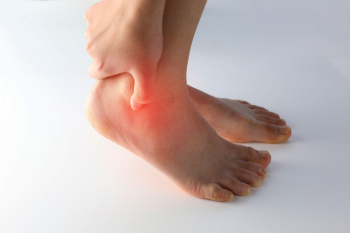
The Achilles tendon connects the calf muscles to the heel and helps the foot move when walking, running, and jumping. Injuries to this strong tendon can range from mild to severe. One type involves soreness and stiffness that develop over time from repeated strain. It is often felt either along the tendon or where it attaches to the heel. Another type of Achilles tendon injury causes swelling and pain around the tendon due to irritation from overuse. Small tears to the Achilles tendon can occur when some fibers are damaged, leading to weakness and ongoing discomfort. A more serious injury, common among athletes, happens when the tendon tears completely. This injury often causes sudden pain and difficulty pushing off the foot or standing on tiptoe. A podiatrist can determine the type and severity of the injury and recommend appropriate treatment, which may include activity changes, support devices, or surgery. If you have injured your Achilles tendon, it is suggested that you make an appointment with a podiatrist for an exam, diagnosis, and treatment.
Achilles tendon injuries need immediate attention to avoid future complications. If you have any concerns, contact Joseph Creswell, DPM of Practice. Our practitioner can provide the care you need to keep you pain-free and on your feet.
What Is the Achilles Tendon?
The Achilles tendon is a tendon that connects the lower leg muscles and calf to the heel of the foot. It is the strongest tendon in the human body and is essential for making movement possible. Because this tendon is such an integral part of the body, any injuries to it can create immense difficulties and should immediately be presented to a doctor.
What Are the Symptoms of an Achilles Tendon Injury?
There are various types of injuries that can affect the Achilles tendon. The two most common injuries are Achilles tendinitis and ruptures of the tendon.
Achilles Tendinitis Symptoms
- Inflammation
- Dull to severe pain
- Increased blood flow to the tendon
- Thickening of the tendon
Rupture Symptoms
- Extreme pain and swelling in the foot
- Total immobility
Treatment and Prevention
Achilles tendon injuries are diagnosed by a thorough physical evaluation, which can include an MRI. Treatment involves rest, physical therapy, and in some cases, surgery. However, various preventative measures can be taken to avoid these injuries, such as:
- Thorough stretching of the tendon before and after exercise
- Strengthening exercises like calf raises, squats, leg curls, leg extensions, leg raises, lunges, and leg presses
If you have any questions please feel free to contact our office located in Wallace, ID . We offer the newest diagnostic tools and technology to treat your foot and ankle needs.

A diabetic foot ulcer needs attentive, steady care because even a small wound can become a significant concern, if it is overlooked. High blood sugar can slow healing and reduce sensation, making it easy for an ulcer to progress without obvious warning signs. Keeping the area clean and protected helps limit infection risk, while avoiding pressure on the sore gives the tissue a chance to repair. Checking your feet every day allows you to notice redness, drainage, swelling, or warmth before the problem advances. Wearing supportive footwear and having balanced blood sugar levels also play important roles in recovery. Since each ulcer requires a tailored approach, early evaluation ensures the right treatment, which may include specialized dressings or advanced wound therapies. If you see a foot sore that is not improving or feels different than usual, it is suggested that you see a podiatrist for an accurate diagnosis and appropriate care.
Wound care is an important part in dealing with diabetes. If you have diabetes and a foot wound or would like more information about wound care for diabetics, consult with Joseph Creswell, DPM from Practice. Our practitioner will assess your condition and provide you with quality foot and ankle treatment.
What Is Wound Care?
Wound care is the practice of taking proper care of a wound. This can range from the smallest to the largest of wounds. While everyone can benefit from proper wound care, it is much more important for diabetics. Diabetics often suffer from poor blood circulation which causes wounds to heal much slower than they would in a non-diabetic.
What Is the Importance of Wound Care?
While it may not seem apparent with small ulcers on the foot, for diabetics, any size ulcer can become infected. Diabetics often also suffer from neuropathy, or nerve loss. This means they might not even feel when they have an ulcer on their foot. If the wound becomes severely infected, amputation may be necessary. Therefore, it is of the upmost importance to properly care for any and all foot wounds.
How to Care for Wounds
The best way to care for foot wounds is to prevent them. For diabetics, this means daily inspections of the feet for any signs of abnormalities or ulcers. It is also recommended to see a podiatrist several times a year for a foot inspection. If you do have an ulcer, run the wound under water to clear dirt from the wound; then apply antibiotic ointment to the wound and cover with a bandage. Bandages should be changed daily and keeping pressure off the wound is smart. It is advised to see a podiatrist, who can keep an eye on it.
If you have any questions please contact our office located in Wallace, ID . We offer the newest diagnostic and treatment technologies for all your foot and ankle needs.

A swollen big toe can be painful and may interfere with walking or daily activities. One common cause is an ingrown toenail, which occurs when the nail edge grows into the surrounding skin and leads to redness and swelling. A fracture in the toe bone can also cause sudden swelling, bruising, and tenderness after an injury. Bunions often create chronic swelling at the base of the big toe due to joint misalignment. Additionally, gout is another cause and may lead to intense swelling, warmth, and pain from uric acid buildup. Hallux rigidus causes stiffness and swelling from arthritis in the big toe joint. A podiatrist can determine the exact cause through examination and imaging, then provide proper treatment to relieve pain and restore function. If big toe swelling persists or worsens, it is suggested that you consult a podiatrist for an expert evaluation and appropriate care.
Toe pain can disrupt your daily activities. If you have any concerns, contact Joseph Creswell, DPM of Practice. Our practitioner can provide the care you need to keep you pain-free and on your feet.
What Causes Toe Pain?
Most severe toe pain is caused due to a sports injury, trauma from dropping something heavy on the toe, or bumping into something rigid. Other problems can develop over time for various reasons.
Toe pain can be caused by one or more ailments. The most common include:
- Trauma
- Sports injury
- Wearing shoes that are too tight
- Arthritis
- Gout
- Corns and calluses
- Hammertoe
- Bunions
- Blisters
- Ingrown toenails
- Sprains
- Fractures (broken bones)
- Dislocations
When to See a Podiatrist
- Severe pain
- Persistent pain that lasts more than a week
- Signs of infection
- Continued swelling
- Pain that prevents walking
Diagnosis
In many cases the cause of toe pain is obvious, but in others, a podiatrist may want to use more advanced methods to determine the problem. These can range from simple visual inspections and sensation tests to X-rays and MRI scans. Prior medical history, family medical history, and any recent physical traumatic events will all be taken into consideration for a proper diagnosis.
Treatment
Treatments for toe pain and injuries vary and may include shoe inserts, padding, taping, medicines, injections, and in some cases, surgery. If you believe that you have broken a toe, please see a podiatrist as soon as possible.
If you have any questions please contact our office located in Wallace, ID . We offer the newest diagnostic and treatment technologies for all your foot and ankle needs.

Ankle pain caused by sinus tarsi syndrome develops when the small tunnel between the talus and calcaneus becomes irritated or strained. This area helps guide ankle movement, and it can be injured after an ankle sprain, long-term standing, or from feet that roll inward, which increases pressure on the tunnel. Symptoms include pain on the outer front part of the ankle, along with a sense of weakness or wobbling while walking on uneven ground. The ligaments surrounding the tunnel can become irritated, leading to swelling and discomfort with each step. A podiatrist can check foot alignment, look for instability in the ankle, and recommend supportive inserts, bracing, or surgery, if other options do not help. Restoring ankle stability reduces pressure on the sinus tarsi and improves comfort. If you have symptoms of sinus tarsi syndrome, it is suggested that you schedule an appointment with a podiatrist for a diagnosis and options for treatment.
Ankle pain can be caused by a number of problems and may be potentially serious. If you have ankle pain, consult with Joseph Creswell, DPM from Practice. Our practitioner will assess your condition and provide you with quality foot and ankle treatment.
Ankle pain is any condition that causes pain in the ankle. Due to the fact that the ankle consists of tendons, muscles, bones, and ligaments, ankle pain can come from a number of different conditions.
Causes
The most common causes of ankle pain include:
- Types of arthritis (rheumatoid, osteoarthritis, and gout)
- Ankle sprains
- Broken ankles
- Achilles tendonitis
- Achilles tendon rupture
- Stress fractures
- Bursitis
- Tarsal tunnel syndrome
- Plantar fasciitis
Symptoms
Symptoms of ankle injury vary based upon the condition. Pain may include general pain and discomfort, swelling, aching, redness, bruising, burning or stabbing sensations, and/or loss of sensation.
Diagnosis
Due to the wide variety of potential causes of ankle pain, podiatrists will utilize a number of different methods to properly diagnose ankle pain. This can include asking for personal and family medical histories and of any recent injuries. Further diagnosis may include sensation tests, a physical examination, and potentially x-rays or other imaging tests.
Treatment
Just as the range of causes varies widely, so do treatments. Some more common treatments are rest, ice packs, keeping pressure off the foot, orthotics and braces, medication for inflammation and pain, and surgery.
If you have any questions please feel free to contact our office located in Wallace, ID . We offer the newest diagnostic tools and technology to treat your foot and ankle needs.
